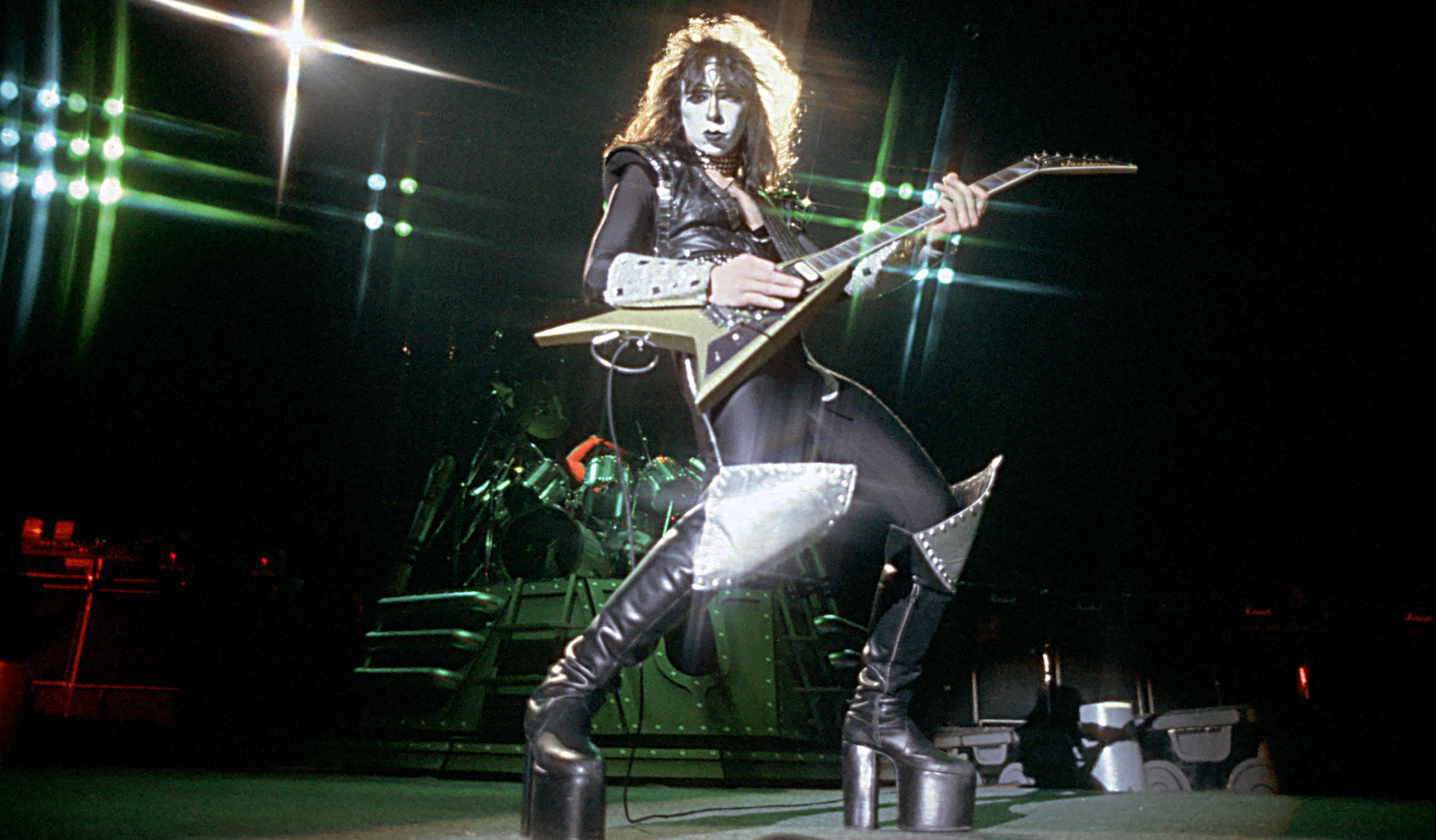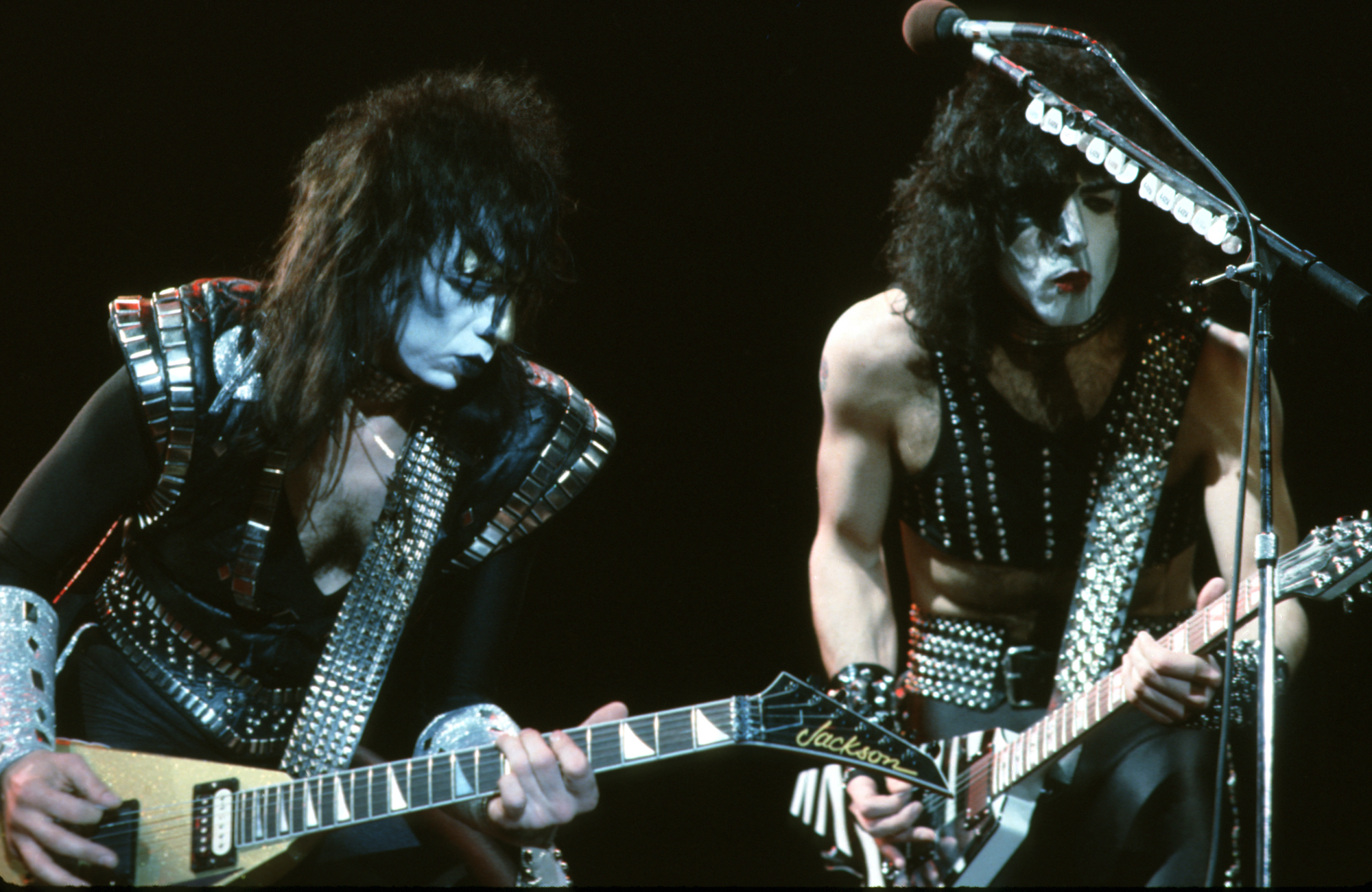Vinnie Vincent's controversial Kiss solos drove Gene Simmons and Paul Stanley mad – watch one of the guitarist's craziest live wigouts
Vincent brought an of-the-moment edge to Kiss's hard-rock sound in the early '80s, but his attention-grabbing antics proved to be unpopular with the band's two leaders

Less well-known than other Kiss lead electric guitar players like Tommy Thayer, Bruce Kulick and, of course, the original, Ace Frehley, Vinnie Vincent nonetheless came along at a crucial point in the band's history.
It was 1982, and Kiss's commercial fortunes had yet to recover from their disastrous, widely-mocked 1981 concept album, Music from "The Elder." Though publicly a member of the band until the end of that year, Frehley was for all intents and purposes out of the picture, leading Kiss to cycle through a number of session guitarists for their new recordings in 1982.
Soon though, the band settled on one Vincent John Cusano, who immediately made his mark on that year's Creatures of the Night album, playing lead guitar on all but three of the LP's tracks, and even co-writing three. Soon re-named Vinnie Vincent, the guitarist brought an explosive, of-the-moment edge to the band's sound, one that stood in marked contrast to Frehley's more old-school leanings.
His no-holds-barred solo on A Million to One, from 1983's Lick It Up, in particular, still stands tall as one of the finest six-string moments in the Kiss catalog that don't feature Frehley.
Vincent brought that same lightning-rod energy to the stage, where – during the band's tours from 1982 through 1984 – he took center stage night after night with frenzied guitar solos that grew increasingly outlandish as his time with the band went on.
The below example – captured at the band's March 12, 1984 concert at the Colisée de Québec in Québec City, Canada – is one of the best-preserved ones on the internet.
While flying around the fretboard, Vincent gives an A+ lesson in showmanship, falling to his knees while holding single notes for all they're worth, pausing for dramatic effect, and incorporating the crowd throughout. The solo also shows how Vincent wasn't afraid to explore dissonant sounds either, with some particularly daring and cacophonous moments that wouldn't sound out of place on a Sonic Youth album.
Get The Pick Newsletter
All the latest guitar news, interviews, lessons, reviews, deals and more, direct to your inbox!
As much as the audience seems to enjoy the display of fretboard pyrotechnics, the rest of Kiss – particularly the band's co-leaders, Gene Simmons and Paul Stanley – were significantly less impressed.
As Vincent's solos, such as the Québec City example above, grew wilder and longer, Simmons and Stanley in turn became increasingly irritated with what they saw as the guitarist's excessive showboating.
In his 2014 memoir, Face the Music, Stanley wrote that Vincent "was hell-bent on using every solo as an opportunity to showcase himself.
“We used to call it the high point of the show," Stanley wrote (via Rolling Stone), "because everybody in the audience left to go get high.”
"He [Vincent] could play rings around most anybody," Simmons offered in a 2014 Guitar World interview. "But with all due respect to Vinnie, it was a fucking nightmare."
Stanley, for one, shared Frehley's love of the late '60s/early '70s blues-rock guitar heroes, and had little regard for the shred tidal wave sweeping the guitar world at that point (an issue that, as Stanley pointed out in a 2014 Guitar World interview, reared its head again with Vincent's eventual, short-lived replacement in the band, the similarly speed- and flash-minded Mark St. John.)
“He had no sense of what to play or when,” Stanley wrote in regards to Vincent, “and he had no ability to self-edit.”

Inevitably, Vincent wasn't long for the band, and parted ways with them just days after the March 12, 1984 Québec City show, when the band wrapped up the North American leg of their Lick it Up tour.
Despite his one-time bandmates' dim view of his onstage soloing though, and their acrimonious parting of ways, Vincent has expressed few regrets about his playing with the band in the years since.
“I’m an over the top kind of guy,” Vincent said in a 1987 radio interview (via Rolling Stone.) “I like it. It’s extreme and excessive. I think as spectacular as Kiss was with their live show, they were conservative musically. I think they were looking for more a generic, old school kind of guitar player. I think that’s what they wanted me to do. But that wasn’t in my blood.”
Jackson is an Associate Editor at GuitarWorld.com. He’s been writing and editing stories about new gear, technique and guitar-driven music both old and new since 2014, and has also written extensively on the same topics for Guitar Player. Elsewhere, his album reviews and essays have appeared in Louder and Unrecorded. Though open to music of all kinds, his greatest love has always been indie, and everything that falls under its massive umbrella. To that end, you can find him on Twitter crowing about whatever great new guitar band you need to drop everything to hear right now.
“His songs are timeless, you can’t tell if they were written in the 1400s or now”: Michael Hurley, guitarist and singer/songwriter known as the ‘Godfather of freak folk,’ dies at 83
“The future is pretty bright”: Norman's Rare Guitars has unearthed another future blues great – and the 15-year-old guitar star has already jammed with Michael Lemmo










